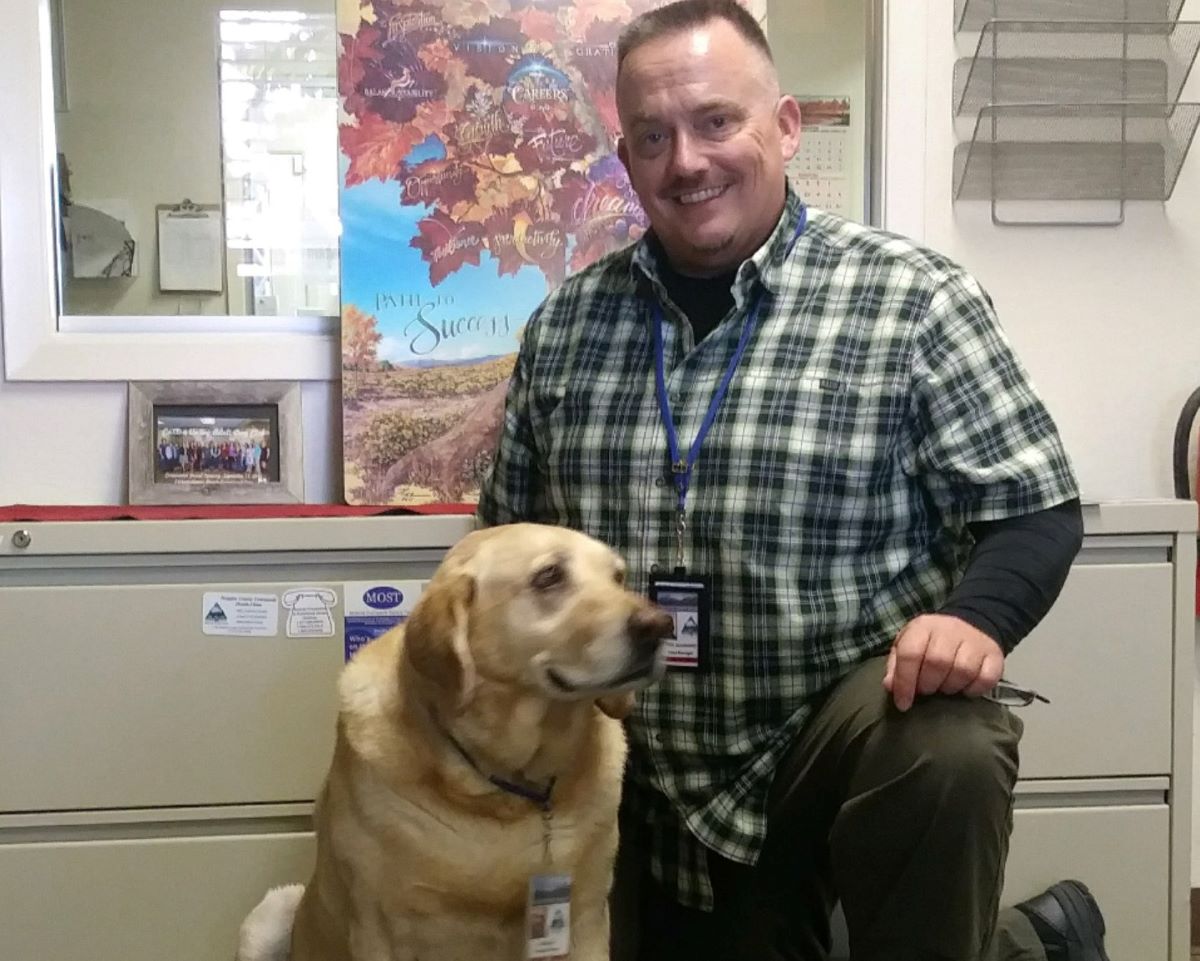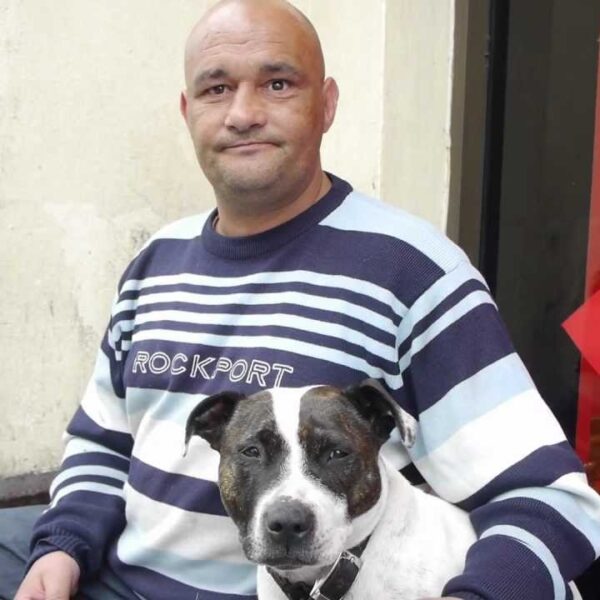Advocates Maintain Pets Can Help Homeless People
Erik Aalgaard remembers the hurtful words that people told him while he was homeless with the only friend he had left in this world: Buddy, his golden lab.
“They said, ‘You can’t even take care of yourself; how can you take care of a dog?’” Aalgaard explained.
But he gives Buddy, a.k.a. Buddybear, all of the credit for helping him overcome homelessness.
“I know that deep in my heart that he saved my life,” Aalgaard said during a recent interview from Gardenerville, Nevada. “My dog saved my life.”
Like any special dog, Buddy made a difference by opening hearts and doors in the most unexpected ways.
“The great thing about Buddy is that I could get angry, upset, mad and every time I explained it to him – why I’m upset – he’d always do the same thing,” Aalgaard said.
“He’d smile, wag his tail and try to give me a kiss. That’s what I needed; somebody to just understand and not judge. And that was [Buddy].”
Not one, but several miracles are weaved through Aalgaard’s story of survival and the power of the unconditional love of a dog.
“There were blessings all over this story,” Aalgaard said. “They were everywhere. I just didn’t know they were blessings at the time.”
The healing that Buddy gave to Aalgaard is a reminder of the national debate about whether homeless shelters should allow people to bring in their pets. Advocates say pets can actually help homeless people overcome their situation.
California Bill Aims to Help Homeless People and Their Pets
In California, a bill by Sen. Robert Hertzberg (D-Van Nuys) proposes giving $5 million in grant funding to homeless shelters so they can offer shelter, food and basic veterinary services for pets. In March, his bill, SB 258, cleared the Senate Human Service Committee.
“Over two thirds of the homeless population in our state is unsheltered, and yet there are far too many empty beds in shelters across Los Angeles County, each night people don’t want to leave their best friend on the street,” Sen. Hertzberg said in a prepared statement. “This bill may be about pets, but in caring for pets, we are supporting both ends of the leash. This is a common sense way to quickly help people get off the street.”
An estimated five to 10 percent of the nation’s 3.5 million homeless people have either a dog or a cat, or both. In certain areas of the country, as many as 25 percent of homeless people have pets, according to Pets of the Homeless, a national non-profit group based in Carson City, Nevada.
When people and their pets become homeless, they face the heartbreaking decision of either forgoing shelter or giving up their best friend.
That’s exactly what happened to Aalgaard.
His descent from a suburban dream life to living alone on the streets began after he was laid off from his job as a youth counselor in 2011 and had no immediate prospects to replace it. Aalgaard’s life began falling apart at a time when everything seemed to be coming together. He was recently married and living in a new home in Carson City with his wife.
But the job loss and a series of other events placed an unbearable strain on their marriage. Shortly after his wife walked out, Aalgaard’s house went into foreclosure. He put everything he owned into a storage unit and remained hopeful that he could quickly recover.
The challenge, however, was greater than he expected.
“I tried to find another job, and couldn’t,” he explained.
Without fully realizing it, Aalgaard became more and more depressed. Although he’d counseled others through depression, he didn’t recognize the symptoms in himself.
“I never saw it coming. And once I was in it, I didn’t know how to get out of it,” Aalgaard explained. “I started isolating.”
“I lost everything,” he continued. “At that point, it was just my dog and myself. Because I had pushed everyone in my family away.”
Aalgaard had never been depressed, let alone homeless, and he didn’t know where to turn. The only thing he could think of was to reach out to a trusted counselor he knew. Then he learned that she had recently passed away following a fight with cancer.
“She was gone, too,” he said. “The only constant I had through this entire process was my dog.”
At one point in 2013, Aalgaard almost lost Buddy.
Aalgaard picked up a few odd jobs doing yard work and brought Buddy along on one of them. The dog went rummaging through some garbage and accidentally swallowed a peach pit, which made him gravely ill. But Aalgaard had no idea what was going on when Buddy suddenly stopped eating and drinking water for days.
He said he was concerned but had no money.
Buddy’s condition made a sharp downward spike and Aalgaard believed that his best friend wasn’t going to make it.
Not knowing what else to do, Aalgaard took Buddy to a park that was near the home he once owned.
“I went to the park and I laid out a blanket because that’s where we went, every single morning before I went to work,” he said. “And I laid out a blanket for both of us, and laid down, and figured that was the day that he probably was going to die.”
Aalgaard laid there, petting Buddy and reflecting on their life together.
“I was crying and didn’t know what to do, and I was just struggling,” he said.
Suddenly, four dogs came running through the park and sat in a half-circle around Buddy.
“They sat, and just started howling,” Aalgaard said
The dogs’ owners arrived next and asked Aalgaard if he and Buddy were okay. One of the dog “parents” gave him money for gas, another offered to buy him something to eat, and a third person said she’d pray for him and Buddy.
Then, one of his old neighbors came driving by and asked what was happening.
“She said, ‘I work next to a place called Pets of the Homeless and they can help you,’” Aalgaard said.
“She was the connection I needed,” Aalgaard said. “All of this happened instantly.”
Pets of the Homeless, Petco and the Humane Society Help Buddy
Pets of the Homeless paid about $500 for an ultrasound, which revealed Buddy had a peach pit lodged in his intestine.
“The doctor came out and said, ‘Your dog’s going to need a $4,800 surgery and the only surgeon in the area is in San Francisco, and we would have to fly him in,’” said Aalgaard. “So, we would need to have the money upfront. Again, I didn’t know what to do. I drove around for four hours. I went to all of the vet places and they wouldn’t help me because I didn’t have the money upfront.”
He finally made his way to the local Petco at 8:59 p.m., just as the door was closing. He pleaded with the store manager to help him, and she contacted one of her friends from the Humane Society. Through a series of arrangements made almost instantly, Aaalgaard found himself driving to Gardnerville, Nevada, a small town about 15 miles south of Carson City.
When he arrived, a veterinarian was waiting to perform emergency surgery on Buddy. At the time, it was uncertain if Buddy would survive.
“He’s never given up on me and I’m not giving up on him,” Aalgaard said he told the vet.
In the end, a vet bill for thousands of dollars was paid in full by people who asked to remain anonymous. Aalgaard also paid a portion of the bill.
“If they hadn’t done what they’d done, Buddy wouldn’t be here,” said Aalgaard. “And I don’t know if I would be here. Because he was my strength through my homelessness.”
After the surgery, the Humane Society gave Aalgaard a jar of coins donated by school children who heard about Buddy’s story.
But there was still one more miracle in store.
Aalgaard’s truck ran out of gas in front of the Douglas County Social Services office in Gardnerville. And when the agency’s employees saw Buddy, they rushed outside to see what was going on.
After learning about his situation, the agency enrolled Aalgaard in a workforce development program. Eventually, that led him to landing a job as a counselor with the agency. As an added bonus, he gets to bring Buddy to work every day.
“They saw something in me, and they loved my dog,” Aalgard said. “This is where Buddy helped me. If Buddy wasn’t there, they probably wouldn’t have reached out like that.”
After Buddy recovered from his surgery, Aalgaard took him back to Carson City. He slept in a parking lot, waiting for Pets of the Homeless to open so he could thank them.
Aalgaard is considered one of the nonprofit’s biggest success stories.
Renee Lowry, Executive Director of Pets of the Homeless, said she completely understands why homeless people want to keep their pets.
“I would never just leave my pet behind,” Lowry said. “She would have to come with me.”
Many homeless people feel the same.
“If you’re homeless, you’re completely alone and by yourself and these pets are providing this unconditional love to these people and there’s no other way for them to do this on their own,” Lowry said.
Sadly, Aalgaard’s story is not entirely unique.
“We get calls constantly with pet emergencies and in the process of interviewing these people we find out quite a bit about their lives and how they became homeless,” Lowry said. “And it’s heartbreaking for them. A lot of times these pets are saving their lives.”
Aalgaard said that through it all, Buddy taught him so many lessons. And he’s still teaching him today.
“He’s not getting anxiety about what’s going to happen tomorrow and he’s not living in the past,” Aalgaard said.
“He teaches me every day to live in the now. Because that’s all we have.”













